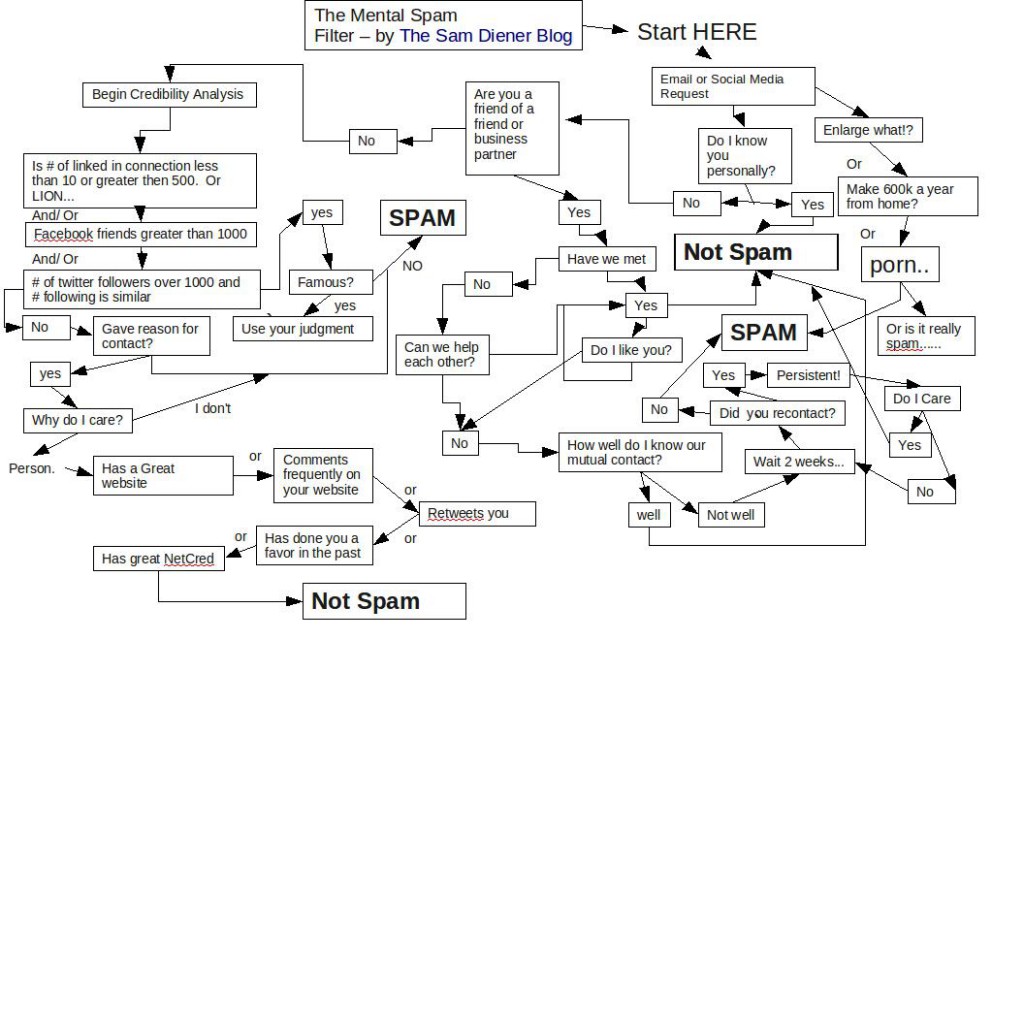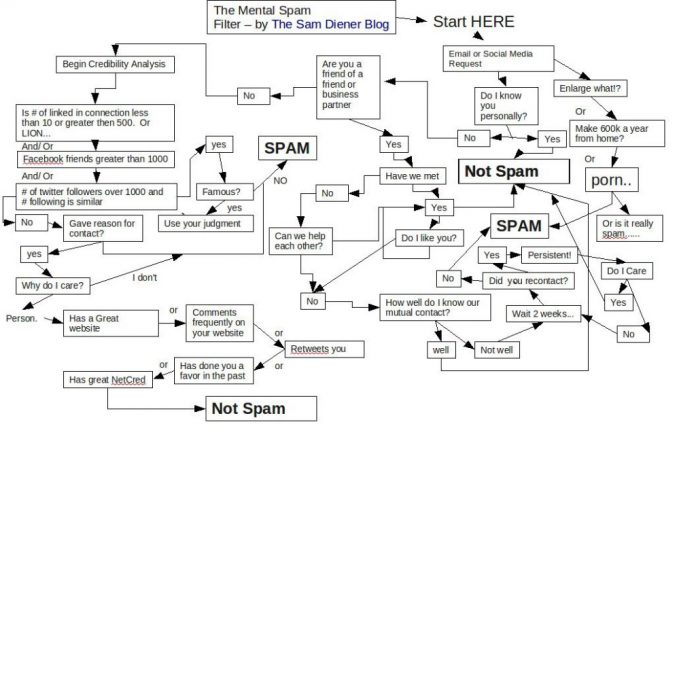Did you know that spammers are the true pioneers of social media? I’m serious – they really are.
They were here long before all of our favorite social media! These “spammers” create huge netlists and then send out their “status updates”. Today I received 89 emails from “jokers”, “free pre-purchase viagra”, “hot matches” requesting their friendly request to “learn how to create a life of unlimited wealth”.
Similarly, I woke up this morning to twenty connect and friend requests on my various Linked-In, Facebook, and Ning accounts. Oh, and we can’t forget all the “helpful” people who felt they needed to tweet “@phillyinnovator” to share with me new ways to get followers on Twitter.
Who are you people!? We’ve never met, never will, and you’ve done nothing for me! I won’t be your Facebook friend, your Linked-In connection, I won’t follow you on Twitter, or anything like that. And if somehow we are connected to the electronic network, believe me; I’m not going to help you achieve anything.
And so I created NetCred. This is a personal measure of how far I will go to help electronic communications, or, in the first place, whether I will contact you. In case I don’t know you, NetCred is all that stands between you and my SPAM folder. Basically, NetCred is my personal phrase for “trust the internet”.
When I talk about how to communicate in real life, I say that you have about ten seconds to make a first impression. If you haven’t read the article, know that 7 seconds of your first impression comes before you meet someone in person.
Guess what’s amazing about digital World? You can install NetCred before the first “meeting!” You can literally dictate your first impression!
The first thing you need to know about NetCred is that your connection numbers on any social network can hurt you right away. Both extremely low and a large number of connections are immediately frightening. A large number of connections suggests that you will connect with anyone and have no real interest in creating any kind of relationship with people, which makes you look fake and untrustworthy. A small number of references to people suggests that you are not really interested in making contacts, you are lazy or do not know how to use Internet tools to network – all this damages your NetCred.
Unless you’re a superstar, I’m already sure asking a favor from any of these connections is just as good as asking your sixth uncle’s second cousin to give you free tickets to the Super Bowl. To be honest, I don’t want to be put in the position of being asked, so I probably won’t even contact you.
There are two ways to build your NetCred: trust in society and trust in yourself. Let’s take a look at each:
Table of Contents
NetCRED
Social Credibility:
Gaining social credibility is your key to making good connections online. And the best part is that it’s very easy to make! You just need to do “clean services” so that someone can remember you when it’s time for someone to help you. Essentially, karma is the key and it comes back to you. Keep in mind that you don’t have to know someone personally to scratch their back online.
Related: There are so many things you can do on Linked-In. Send someone a job that might suit them. Comment on articles in discussion groups if you like them. Use your status messages to share others’ achievements, and comment when someone posts a new status message. Join other groups and start thoughtful discussions and participate in others. Answer the questions in your area of expertise in the Questions section. Be an active user and others will remember you.
Facebook: If the person has a Facebook fan group that you like. Join now! But… make sure your personal interests don’t interfere with your business. Keep it under wraps. Facebook was designed to help real friends share the real details of their lives, and it’s GREAT for that purpose. But if I don’t know you well enough to personally tell you the personal details of my life, you shouldn’t be my Facebook friend.
Twitter: Repost articles! Comment on other people’s tweets. Do Watch Fridays. Comment in discussions with the #hashtag. Publicly share other relevant achievements. Be an active user and get noticed. If you are only there for your own interests, you will be left out for someone who is not.
Blogs: Comment on them if you liked the article! It took someone a long time to write a high-quality article, so be polite by letting them know your thoughts. Or even if you don’t like the article or don’t agree with it, let them know! It helps them improve or see something through a different lens. Do you see the “share” option at the bottom of the article? Do it too! Check out sites like Digg, StumpleUpon, and Technorati and submit whatever you like. And if you’re blogging, link to other articles you like! Being a passive reader and not commenting, sharing, or showing appreciation can hurt your connection potential.
Email: There is nothing wrong with a congratulation or thank you letter. If you hear about a promotion at a company, send that person a short congratulatory note. If you appreciate someone’s work, send them an email! I’ve made a number of huge connections online just by sending a “Hi, I think you’re amazing” email.
Sites: If you have a website and know an expert who has a great opinion on what you’re talking about, link to it. For example, if you write or blog about one of my articles on your blog or newsletter and then link to it, I get a pretty interesting little notification that you are quoting or linking to me (this is called pingback or trackback) . I try to know EVERY site that links to me and usually send thanks to the author. So, guess what happens when THIS person needs a favor?
Personal Trust:
Personal online authority has a lot to do with your ability to build your own brand. There are hundreds of resources for each of these items, but let’s quickly recap….
- Connected – Have an attractive and detailed LinkedIn profile. Your title is EXTREMELY important. You MUST have a professional photo. Quality references from peers, customers and supervisors are also required. Listing interests and joining groups are also very important, as they increase the likelihood that you will share an interest with a future colleague. You can gain A LOT of trust by creating a linked group and growing it to a decent size.
- facebook Facebook can REALLY hurt you. Be careful. I’m serious.
- Twitter – Have a twitter account – if you can bear it. Just be yourself and talk about what interests you. This way you will collect subscribers if you have interesting content. If you can’t come up with interesting content, just share what you find interesting from other people.
- Google- Be number 1 when searching for your name on Google.
- Web site – Create a website for yourself. Many people choose to blog. Just choose a topic that interests you and work with it. Then generate traffic by getting people to read, share, and comment on your blog posts and articles. To gain trust, you need people commenting on your page.
- Social media “I don’t really participate in too many of them. Social networks are sites like Ning and Friendster. The rule really is: if it’s good for you, use it. However, if you’re just signing up to sign up and you don’t contribute properly, it’s not very trustworthy or helpful.
Findings: Making new connections over the Internet is becoming a daily experience. And yet it is EXTREMELY important that these new connections make the best first impression. I hope you find this useful and make the necessary changes! Oh, and for fun, here’s a graphical representation of the NetCred process that I made.

So, did this article teach you how to leave comments?
About the author: Sam Diener is an up-and-coming entrepreneur from Philadelphia. He writes and blogs Sam Diener about “things for success” including how to communicate professionally and other skills you can use to make a difference in your life. Expect more from him soon!









































